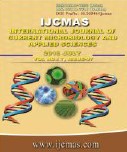


 National Academy of Agricultural Sciences (NAAS)
National Academy of Agricultural Sciences (NAAS)

|
PRINT ISSN : 2319-7692
Online ISSN : 2319-7706 Issues : 12 per year Publisher : Excellent Publishers Email : editorijcmas@gmail.com / submit@ijcmas.com Editor-in-chief: Dr.M.Prakash Index Copernicus ICV 2018: 95.39 NAAS RATING 2020: 5.38 |
Low productivity (2680 Kg/hectare) (Directorate of Agriculture, Govt. of Bihar; 2012-13) in Bihar is mainly due to late sowing of wheat coupled with prevalent of hot westerly wind during grain filling stage.The wheat production in state can be increased by two means, either by horizontal expansion or by vertical expansion i.e. by using improved variety or use of antioxidant or growth regulators to cope heat stress in delayed sown condition. Mitigation of elevated temperature on late sown wheat through genetic intervention is under way at many research stations. Study of plant growth regulators in overcoming this abiotic stress of elevated temperature during reproductive stage of wheat is of great importance. The present investigation was carried out at DRPCAU, Pusa Bihar during Rabi 2016-2017, with five plant growth regulating hormones viz., Glycine betaine (600 PPM) (T2), Salicylic acid (800 PPM) (T3), Salicylic acid (400 PPM) (T4), Ascorbic acid (10 PPM) (T5), Tocopherol (150 PPM) (T6) and control (T1) on two varieties HD-2733 (normal sown condition) and HD-2985 (late sown condition) with objective to access induced variation and differential influence created on fifteen agro-morphological traits including yield and seed quality attributes. Different statistical tool undertaken for analysis revealed highly significant differences among entries in respect of fifteen different the agro-morphological traits under study after treatments in both conditions i.e. normal and late sown conditions. Treatment T2 i.e., Glycine betaine (600 PPM), showed significant effect on highest grain yield per plant via, different agro-morphological character mentioned above for normal and delayed sown condition. Yield enhancement due to effect of Treatment T2 Glycine betaine (600 PPM) was recorded 41.30% higher under normal sown condition whereas 44.92% higher under late sown condition in comparison to control. On seed quality traits also showed significant positive effect of Treatment T2 Glycine betaine (600 PPM) was observed for seed germination per cent and viability per cent and no effect on vigour index of seed under both normal and delayed sown condition.
 |
 |
 |
 |
 |